UV Fused Silica Plano-Convex Lenses, Uncoated
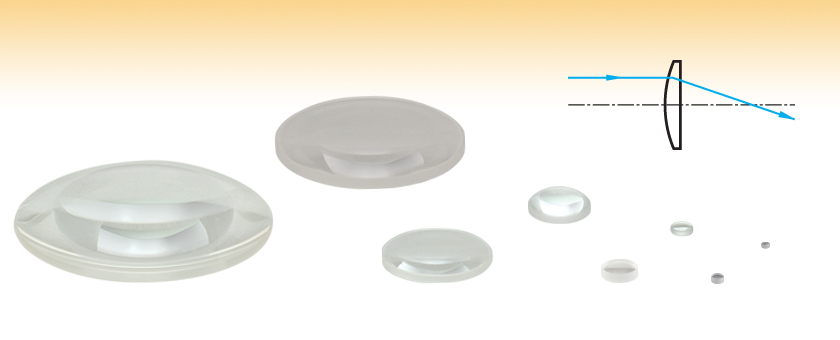
- UV-Grade Fused Silica
- Broadband AR Coating Available
- Near Best Form for Infinite Conjugate Applications
- Wavelength Range: 185 nm - 2.1 µm
- Zemax Files Available
LA4372
(Ø75 mm)
LA4984
(Ø2")
LA4380
(Ø1")
LA4647
(Ø1/2")
LA4194
(Ø6 mm)
LA4249
(Ø5 mm)
LA4039
(Ø3 mm)
LA4024
(Ø2 mm)

Please Wait
| Common Specifications | ||
|---|---|---|
| Available Diameters | 2 mm and 3 mm | 5 mm, 6 mm, 1/2", 1", 2", and 3" |
| Lens Shape | Plano-Convex | |
| Substrate Material | UV-Grade Fused Silicaa | |
| Wavelength Range | 185 nm - 2.1 μm | |
| Design Wavelength | 587.6 nm | |
| Index of Refraction | 1.460 @ 588 nm | |
| Surface Flatness (Plano Side) |
λ/2 | |
| Spherical Surface Power (Convex Side) |
3λ/2b | |
| Surface Irregularity (Peak to Valley) |
λ/4 | |
| Diameter Tolerance | +0.00 / -0.02 mm | +0.00 mm / -0.10 mm |
| Thickness Tolerance | ±0.03 mm | ±0.1 mm |
| Surface Quality | 60-40 Scratch-Dig | 40-20 Scratch-Dig |
| Centration | ≤5 arcmin | <3 arcmin |
| Abbe Number | vd = 67.82 | |
| Clear Aperture | >90% of Diameter | |
| Focal Length Tolerance | ±1% | |
| Click on the red Document icon next to the item numbers below to access the Zemax file download. Our entire Zemax Catalog is also available. |
Features
- Material: UV-Grade Fused Silica
- Wavelength Range: 185 nm - 2.1 μm (Uncoated)
- Focal Lengths Available from 4 - 1000 mm
These uncoated UV-Grade Fused Silica Plano-Convex lenses are available in sizes ranging from Ø2 mm to Ø75 mm. UV-grade fused silica offers high transmission in the deep UV and exhibits virtually no laser-induced fluorescence (as measured at 193 nm), making it an ideal choice for applications from the UV to the near IR. In addition, UV fused silica has better homogeneity and a lower coefficient of thermal expansion than N-BK7.
Plano-convex lenses can focus a collimated beam or collimate light from a point source. To minimize the introduction of spherical aberration, a collimated light source should be incident on the curved surface of the lens when being focused and a point light source should be incident on the planar surface when being collimated. When image quality is not critical, plano-convex lenses can also be used as a substitute for achromatic doublets.
The focal length of each lens can be calculated using a simplified thick lens equation:
f = R /( n -1),
where n is the index of refraction and R is the radius of curvature of the lens surface. These lenses are fabricated from UV-Grade Fused Silica, which has an Abbe Number of 67.82; this value is an indicator of the dispersion.
When deciding between a plano-convex lens and a bi-convex lens, both of which cause collimated incident light to converge, it is usually preferable to choose a plano-convex lens if the desired absolute magnification is either less than 0.2 or greater than 5. Between these two values, bi-convex lenses are generally preferred.
Thorlabs offers fixed lens mounts that can be used for mounting the lenses sold here. For mounting high-curvature lenses in select sizes, extra-thick retaining rings with SM05 (0.535"-40), SM1 (1.035"-40), or SM2 (2.035"-40) threading are available that provide extra clearance for spanner wrenches (see the Mounting Options tab for more information).
UV Fused Silica lens kits are also available. Please click here for information.
| UVFS Plano-Convex Lens Selection Guide | |
|---|---|
| Unmounted Lenses | Mounted Lenses |
| Uncoated | Uncoated |
| -UV Coating (245 - 400 nm) | -UV Coating (245 - 400 nm) |
| -A Coating (350 - 700 nm) | -A Coating (350 - 700 nm) |
| -AB Coating (400 - 1100 nm) | - |
| -B Coating (650 - 1050 nm) | -B Coating (650 - 1050 nm) |
| -C Coating (1050 - 1700 nm) | -C Coating (1050 - 1700 nm) |
| -YAG V-Coating (532/1064 nm) | -YAG V-Coating (532/1064 nm) |
| -405 V-Coating (405 nm) | - |
| -532 V-Coating (532 nm) | - |
| -633 V-Coating (633 nm) | - |
| -1064 V-Coating (1064 nm) | - |
| -1550 V-Coating (1550 nm) | - |
Custom Coatings are also available. Please contact Tech Sales for a quote.
| Quick Links to Other Spherical Singlets | ||||||
|---|---|---|---|---|---|---|
| Plano-Convex | Bi-Convex | Best Form | Plano-Concave | Bi-Concave | Positive Meniscus | Negative Meniscus |
Below is the transmission curve for a 10 mm thick uncoated sample of UV fused silica when the incident light is normal to the surface. Please note that this is the measured transmission, including surface reflections.
Other AR Coatings:
Thorlabs offers V-coatings centered at various wavelengths and broadband AR coatings for the UV, visible, or NIR (shown below). Click here to view all coating options for UV-grade fused silica plano-convex lenses.
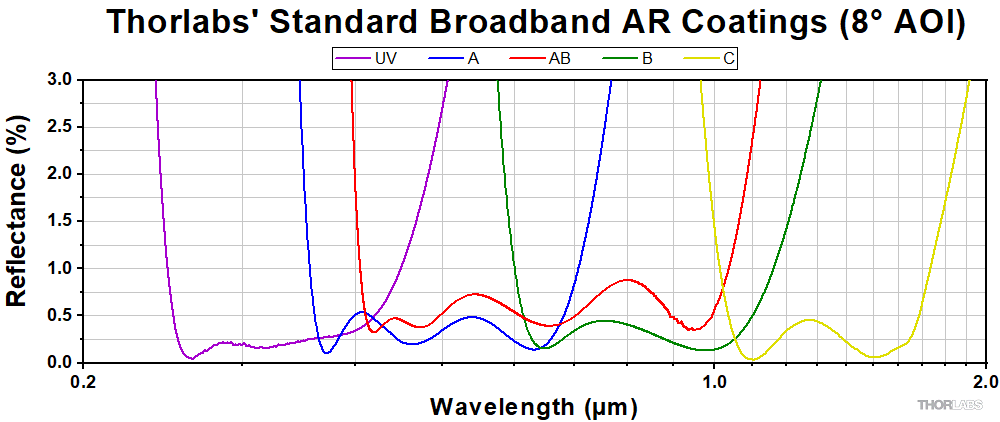
| Recommended Mounting Options for Thorlabs Lenses | ||
|---|---|---|
| Item # | Mounts for Ø2 mm to Ø10 mm Optics | |
| Imperial | Metric | |
| (Various) | Fixed Lens Mounts and Mini-Series Fixed Lens Mounts for Small Optics, Ø5 mm to Ø10 mm | |
| (Various) | Small Optic Adapters for Use with Standard Fixed Lens Mounts, Ø2 mm to Ø10 mm | |
| Item # | Mounts for Ø1/2" (Ø12.7 mm) Optics | |
| Imperial | Metric | |
| LMR05 | LMR05/M | Fixed Lens Mount for Ø1/2" Optics |
| MLH05 | MLH05/M | Mini-Series Fixed Lens Mount for Ø1/2" Optics |
| LM05XY | LM05XY/M | Translating Lens Mount for Ø1/2" Optics |
| SCP05 | 16 mm Cage System, XY Translation Mount for Ø1/2" Optics | |
| (Various) | Ø1/2" Lens Tubes, Optional SM05RRC Retaining Ring for High-Curvature Lenses (See Below) |
|
| Item # | Mounts for Ø1" (Ø25.4 mm) Optics | |
| Imperial | Metric | |
| LMR1 | LMR1/M | Fixed Lens Mount for Ø1" Optics |
| LM1XY | LM1XY/M | Translating Lens Mount for Ø1" Optics |
| ST1XY-S | ST1XY-S/M | Translating Lens Mount with Micrometer Drives (Other Drives Available) |
| CXY1A | 30 mm Cage System, XY Translation Mount for Ø1" Optics | |
| (Various) | Ø1" Lens Tubes, Optional SM1RRC Retaining Ring for High-Curvature Lenses (See Below) |
|
| Item # | Mount for Ø1.5" Optics | |
| Imperial | Metric | |
| LMR1.5 | LMR1.5/M | Fixed Lens Mount for Ø1.5" Optics |
| (Various) | Ø1.5" Lens Tubes, Optional SM1.5RR Retaining Ring for Ø1.5" Lens Tubes and Mounts |
|
| Item # | Mounts for Ø2" (Ø50.8 mm) Optics | |
| Imperial | Metric | |
| LMR2 | LMR2/M | Fixed Lens Mount for Ø2" Optics |
| LM2XY | LM2XY/M | Translating Lens Mount for Ø2" Optics |
| CXY2 | 60 mm Cage System, XY Translation Mount for Ø2" Optics |
|
| (Various) | Ø2" Lens Tubes, Optional SM2RRC Retaining Ring for High-Curvature Lenses (See Below) |
|
| Item # | Adjustable Optic Mounts | |
| Imperial | Metric | |
| LH1 | LH1/M | Adjustable Mount for Ø0.28" (Ø7.1 mm) to Ø1.80" (Ø45.7 mm) Optics |
| LH2 | LH2/M | Adjustable Mount for Ø0.77" (Ø19.6 mm) to Ø2.28" (Ø57.9 mm) Optics |
| VG100 | VG100/M | Adjustable Clamp for Ø0.5" (Ø13 mm) to Ø3.5" (Ø89 mm) Optics |
| SCL03 | SCL03/M | Self-Centering Mount for Ø0.15" (Ø3.8 mm) to Ø1.77" (Ø45.0 mm) Optics |
| SCL04 | SCL04/M | Self-Centering Mount for Ø0.15" (Ø3.8 mm) to Ø3.00" (Ø76.2 mm) Optics |
| LH160C | LH160C/M | Adjustable Mount for 60 mm Cage Systems, Ø0.50" (Ø13 mm) to Ø2.00" (Ø50.8 mm) Optics |
| SCL60C | SCL60C/M | Self-Centering Mount for 60 mm Cage Systems, Ø0.15" (Ø3.8 mm) to Ø1.77" (Ø45.0 mm) Optics |
Mounting High-Curvature Optics
Thorlabs' retaining rings are used to secure unmounted optics within lens tubes or optic mounts. These rings are secured in position using a compatible spanner wrench. For flat or low-curvature optics, standard retaining rings manufactured from anodized aluminum are available from Ø5 mm to Ø4". For high-curvature optics, extra-thick retaining rings are available in Ø1/2", Ø1", and Ø2" sizes.
Extra-thick retaining rings offer several features that aid in mounting high-curvature optics such as aspheric lenses, short-focal-length plano-convex lenses, and condenser lenses. As shown in the animation to the right, the guide flange of the spanner wrench will collide with the surface of high-curvature lenses when using a standard retaining ring, potentially scratching the optic. This contact also creates a gap between the spanner wrench and retaining ring, preventing the ring from tightening correctly. Extra-thick retaining rings provide the necessary clearance for the spanner wrench to secure the lens without coming into contact with the optic surface.
| Posted Comments: | |
Deepak Korhalkar
(posted 2024-03-18 01:55:56.58) Kindly let us know the EFL & BFL for this lens ( LA 4647) at 2.1 micron wavelength.
Thanks & Regards. cdolbashian
(posted 2024-03-29 12:04:38.0) Thank you for contacting Thorlabs. The designed effective focal length and back focal length of LA4647 at 2.1um are 21.1mm and 18.1mm respectively. The data can be extracted from the Zemax model, typically found within the prescription data, which can be download from the "Docs" icon in front of the part number. Deepak Korhalkar
(posted 2023-12-05 20:27:34.29) May i request you to kindly give us a spot diagram for this lens, for a perfectly parallel beam at 2 micron wavelength normally incident on the lens on the Curved surface.
Thanks & Regards. cdolbashian
(posted 2023-12-11 10:42:25.0) Thank you for reaching out to us with this request. I have contacted you directly with this information, though for future requests similar please reach out to your local tech support team. user
(posted 2022-04-29 19:46:34.627) The ad rates these to 185nm but the data for transmission is only to 200nm. Can you please supply the full CVS data set? Thank you! jgreschler
(posted 2022-05-03 09:14:37.0) Thank you for reaching out to Thorlabs. Additional data can be requested by emailing techsupport@thorlabs.com. Thomas.Bluemchen
(posted 2018-12-14 10:12:23.86) Hallo,
warum unterscheiden sich die Daten in der Zeichnung und im zmx-File? Bitte senden Sie mir korrekte Designdaten, damit ich die Linse in einem Design verwenden kann. Bieten Sie auch AR-Coatings für 193nm an?
Mit freundlichen Grueßen
Th. Bluemchen nbayconich
(posted 2018-12-17 03:25:17.0) Thank you for contacting Thorabs. Would it be possible to mention the particular discrepancy you were referring to? Is there some specific information you were looking for like transmission, reflection etc?
I will reach out to you directly to discuss our custom capabilities. deepak.korhalkar
(posted 2017-02-19 22:01:00.287) This lens is 1 inch dia. Can you offer a variation with only change being 30 mm dia. Remaining all stays same ( except edge thickness ). Also, can this be offered with 'D' coating - covering 2.1 micron wavelength ? Qty required will be 20.
Thanks & regards. tfrisch
(posted 2017-02-20 10:04:03.0) Hello, thank you for contacting Thorlabs. I have forwarded your request to our Tech Support Team to assist with custom quoting. They will reach out to you directly. mg9420
(posted 2016-08-02 13:07:45.863) Hello,Thorlabs
Would you customize some special specification of lens for us?
The lenses are similar to LA4647 that diameter is half inch ,but they focal Length change to 15mm and 25mm.
Quantity
1.f=25mm *2
2.f=15mm *2 euv.ilya
(posted 2016-02-09 17:15:45.857) Hello, I'm trying to calculate the exact focal distance of these lenses using formula R/(n-1) for 355 nm (3rd harmonic of Nd:YAG). Would you please tell me the exact value of refractive index at this wavelength? Alternatively, you can send me .txt or .csv data with the whole range available. Thanks! besembeson
(posted 2016-02-10 09:14:40.0) Response from Bweh at Thorlabs USA: These are made from UV fused silica. It is 1.4761 at 355nm. We also have the dispersion plot at the following link: http://www.thorlabs.com/newgrouppage9.cfm?objectgroup_id=6973&tabname=UV%20Fused%20Silica. marina.servol
(posted 2013-10-17 11:46:17.017) Hello,
we use UV-fused silica lenses at 300 nm and we notice a blue light emitted by the lens. Is it normal? Could it create problems on the quality of the beam?
Thanks in advances jlow
(posted 2013-10-24 09:32:00.0) Response from Jeremy at Thorlabs: The UVFS lens should have very low autofluorescence. I will contact you directly to discuss about this. s.lazare
(posted 2013-09-05 10:35:23.88) We are looking for lenses f=20 mm like LA4647, but do not want any silica fluorescence when using LED at 365 nm, 280 nm or Laser at 248 nm. Could you provide some data on Nikon NIFS-S series. Thanks Sylvain tcohen
(posted 2013-09-06 12:05:00.0) Response from Tim at Thorlabs: Thank you for contacting us. We don’t have this data on hand but will organize testing. I’ve contacted you via email with more details. CobbJM
(posted 2013-07-18 14:02:54.04) Can you tell me what homogeneity grade of fused silica these lenses are made from? Where is the material from, eg, Schott, Corning, Heraeus, etc. jlow
(posted 2013-07-18 16:12:00.0) Response from Jeremy at Thorlabs: The glass used is from Nikon NIFS-S series. The homogeneity of this glass is not specified by Nikon. jlow
(posted 2012-08-29 12:19:00.0) Response from Jeremy at Thorlabs: Thank you for your feedback on this. We can put different AR coatings on these lenses. I will contact you directly regarding a quote for this. cherold
(posted 2012-08-28 15:57:03.0) I would like to echo previous requests for other AR coatings on fused silica lenses. 532/1064 nm coatings would be particularly useful. Fused silica has a much lower thermal expansion coefficient (than other common glasses) making it a much better substrate for high power (10s of Watts, CW) optics. tcohen
(posted 2012-06-26 10:19:00.0) Response from Tim at Thorlabs: Thank you for your interest in our UVFS Lenses. Although we do not have tested LIDT data for our uncoated substrates, these have very high damage thresholds in comparison to coated or cemented substrates. There is a wealth of information online about LIDT on bulk substrate. As a reference, this paper http://www.precisionphotonics.com/vitem_axpd.asp?id=21&itemtype=Technicalpapers has useful information on damage thresholds. Damage thresholds depend on the optic (substrate, surface quality, any dust or dirt accumulation, coatings, cement) as well as the source (beam diameter, pulse duration, rep rate, intensity profile, wavelength). I will contact you to discuss your source and its suitability with our UVFS lenses. sunil.phys
(posted 2012-06-26 09:02:52.0) What is the damage threshold of UV fused silica used to make lenses in the family of LA4380 (uncoated)? bdada
(posted 2011-07-27 19:19:00.0) Response from Buki at Thorlabs:
Thank you for your feedback Pablo. The performance of the lens is lower than it should be. We have contacted you to initiate the return and replacement of the lenses. moreno
(posted 2011-07-26 07:47:50.0) Dear Sir/Madam,
I am Pablo Moreno, R&D Engineer at Synova S.A. Thorlabs is our first choice in a wide range of products.
We recently acquired a couple of lenses, the LA4184 and the 100 mm focal version. I observe that the transmission of these lenses is very low (ca. 70%). Is this normal? The lenses are UV coated.
To measure the transmission we use a 355nm UV laser, 700 mW, CW. It should be single mode, but I observe also a weak second mode.
It might have happened that I did not order the right lenses. It might be that it is normal to find this low transmission.
I thank you in advance for any information you could give me.
With my best regards,
Pablo Mikhail.Levin
(posted 2011-05-17 12:19:35.0) Do you have fused silica lenses with AR for 1064nm?
I am interesting lenses with fl~50 and D~25mm
thank you
Mikhail Levin Adam
(posted 2010-03-31 16:23:34.0) A response from Adam at Thorlabs to gudipati: We have experimental data down to 183nm that we can provide. Extrapolating the experimental data we have, it looks as if you would see zero percent transmission at 160nm. If you are interested, we can provide a free sample for testing. gudipati
(posted 2010-03-31 12:45:15.0) Hello,
could you send me spectral specification/graph of fused silica below 200 nm? Normally UV grade fused silica should transmit down to 160 nm. I would like to know whether your UV grade fused silica is has similar optical properties.
Regards
Murthy Laurie
(posted 2008-10-13 14:55:11.0) Response from Laurie at Thorlabs to krishe80: Thank you for your feedback. The surface flatness is ~lambda/2 on the spherical side and ~lambda/4 on the flat side. If you have further questions, please let us know. krishe80
(posted 2008-10-12 12:19:55.0) what is the surface accuracy on these lenses? |





 Products Home
Products Home









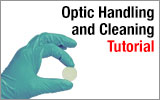
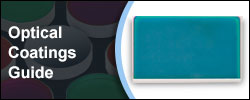
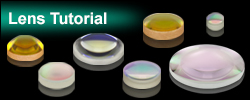
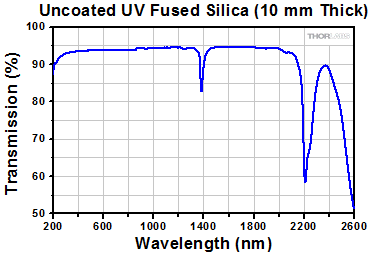
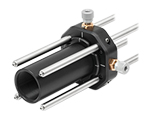
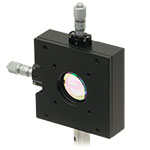
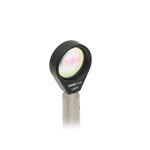
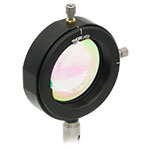
 UV Fused Silica, Uncoated
UV Fused Silica, Uncoated